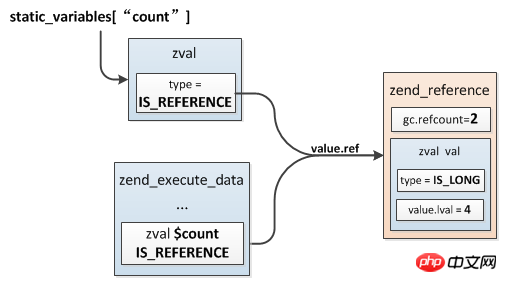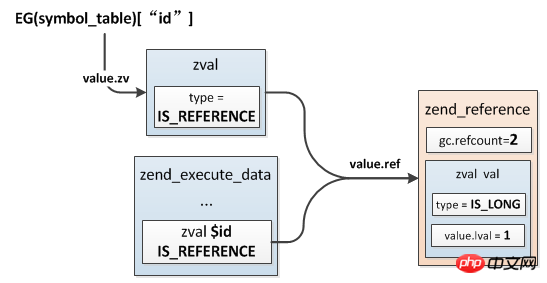 Backend Development
Backend Development
 PHP Tutorial
PHP Tutorial
 PHP7 kernel analysis 4 local variables, global variables, constants
PHP7 kernel analysis 4 local variables, global variables, constants
PHP7 kernel analysis 4 local variables, global variables, constants
The content of this article is about local variables, global variables, and constants in PHP7 Kernel Analysis 4. Now I share it with you. Friends in need can refer to it
1. Local variables
Local variables in PHP are allocated on the zend_execute_data structure. Each time zend_op_array is executed, a new zend_execute_data will be generated. Local variables are allocated at the beginning of execution and then released at the end of execution. This is the local variable life cycle.
Read and write operations: Local variables are read and written through the number determined at compile time
2. Static variables
The storage location of static variables: zend_op_array->static_variables, this is a hash table, so static variables in PHP are different from ordinary local variables. They are not allocated in the execution space zend_execute_data, but in the hash table. The form is saved in zend_op_array. Static variables will only be initialized once. Note: Its initialization occurs in the compilation phase rather than the execution phase. This feature also means that the initial value of a static variable cannot be a variable, for example: static $count = $xxx; Such a definition will result in an error
Read and write operations: First, retrieve the corresponding zval from static_variables based on the variable name, then modify it to a reference type and assign it to a local variable. That is to say, static $count = 4; contains two operations, strictly $count is not a real static variable, it is just a local variable pointing to a static variable. The actual operation when executing is: $count = & static_variables["count"];

3. Global variables
Global variables always exist during the entire request execution, and they are saved in EG( executor_globals , Zend executor-related global variables) in the symbol_table, like the storage of static variables, this is also a hash table. Before zend_execute_ex execution starts, all global variables in the current scope will be added to the EG's symbol_table.
Read and write operations: Like the access of static variables, global variables also convert the original value into a reference, and then create a local variable in the scope of the global import to point to the reference

4. Constants
Constants are stored in EG’s zend_constants hash table and are also accessed Search directly in the hash table according to the constant name
typedef struct _zend_constant {
zval value; //常量值
zend_string *name; //常量名
} zend_constant;Related recommendations:
PHP7 Kernel Analysis 1 CGI and FastCGI
PHP7 I/O model of kernel analysis 2
Variables of PHP7 kernel analysis 3
The above is the detailed content of PHP7 kernel analysis 4 local variables, global variables, constants. For more information, please follow other related articles on the PHP Chinese website!

Hot AI Tools

Undresser.AI Undress
AI-powered app for creating realistic nude photos

AI Clothes Remover
Online AI tool for removing clothes from photos.

Undress AI Tool
Undress images for free

Clothoff.io
AI clothes remover

Video Face Swap
Swap faces in any video effortlessly with our completely free AI face swap tool!

Hot Article

Hot Tools

Notepad++7.3.1
Easy-to-use and free code editor

SublimeText3 Chinese version
Chinese version, very easy to use

Zend Studio 13.0.1
Powerful PHP integrated development environment

Dreamweaver CS6
Visual web development tools

SublimeText3 Mac version
God-level code editing software (SublimeText3)

Hot Topics
 1387
1387
 52
52
 PHP 8.4 Installation and Upgrade guide for Ubuntu and Debian
Dec 24, 2024 pm 04:42 PM
PHP 8.4 Installation and Upgrade guide for Ubuntu and Debian
Dec 24, 2024 pm 04:42 PM
PHP 8.4 brings several new features, security improvements, and performance improvements with healthy amounts of feature deprecations and removals. This guide explains how to install PHP 8.4 or upgrade to PHP 8.4 on Ubuntu, Debian, or their derivati
 How To Set Up Visual Studio Code (VS Code) for PHP Development
Dec 20, 2024 am 11:31 AM
How To Set Up Visual Studio Code (VS Code) for PHP Development
Dec 20, 2024 am 11:31 AM
Visual Studio Code, also known as VS Code, is a free source code editor — or integrated development environment (IDE) — available for all major operating systems. With a large collection of extensions for many programming languages, VS Code can be c
 Explain JSON Web Tokens (JWT) and their use case in PHP APIs.
Apr 05, 2025 am 12:04 AM
Explain JSON Web Tokens (JWT) and their use case in PHP APIs.
Apr 05, 2025 am 12:04 AM
JWT is an open standard based on JSON, used to securely transmit information between parties, mainly for identity authentication and information exchange. 1. JWT consists of three parts: Header, Payload and Signature. 2. The working principle of JWT includes three steps: generating JWT, verifying JWT and parsing Payload. 3. When using JWT for authentication in PHP, JWT can be generated and verified, and user role and permission information can be included in advanced usage. 4. Common errors include signature verification failure, token expiration, and payload oversized. Debugging skills include using debugging tools and logging. 5. Performance optimization and best practices include using appropriate signature algorithms, setting validity periods reasonably,
 How do you parse and process HTML/XML in PHP?
Feb 07, 2025 am 11:57 AM
How do you parse and process HTML/XML in PHP?
Feb 07, 2025 am 11:57 AM
This tutorial demonstrates how to efficiently process XML documents using PHP. XML (eXtensible Markup Language) is a versatile text-based markup language designed for both human readability and machine parsing. It's commonly used for data storage an
 PHP Program to Count Vowels in a String
Feb 07, 2025 pm 12:12 PM
PHP Program to Count Vowels in a String
Feb 07, 2025 pm 12:12 PM
A string is a sequence of characters, including letters, numbers, and symbols. This tutorial will learn how to calculate the number of vowels in a given string in PHP using different methods. The vowels in English are a, e, i, o, u, and they can be uppercase or lowercase. What is a vowel? Vowels are alphabetic characters that represent a specific pronunciation. There are five vowels in English, including uppercase and lowercase: a, e, i, o, u Example 1 Input: String = "Tutorialspoint" Output: 6 explain The vowels in the string "Tutorialspoint" are u, o, i, a, o, i. There are 6 yuan in total
 How to automatically set permissions of unixsocket after system restart?
Mar 31, 2025 pm 11:54 PM
How to automatically set permissions of unixsocket after system restart?
Mar 31, 2025 pm 11:54 PM
How to automatically set the permissions of unixsocket after the system restarts. Every time the system restarts, we need to execute the following command to modify the permissions of unixsocket: sudo...
 Explain late static binding in PHP (static::).
Apr 03, 2025 am 12:04 AM
Explain late static binding in PHP (static::).
Apr 03, 2025 am 12:04 AM
Static binding (static::) implements late static binding (LSB) in PHP, allowing calling classes to be referenced in static contexts rather than defining classes. 1) The parsing process is performed at runtime, 2) Look up the call class in the inheritance relationship, 3) It may bring performance overhead.
 What are PHP magic methods (__construct, __destruct, __call, __get, __set, etc.) and provide use cases?
Apr 03, 2025 am 12:03 AM
What are PHP magic methods (__construct, __destruct, __call, __get, __set, etc.) and provide use cases?
Apr 03, 2025 am 12:03 AM
What are the magic methods of PHP? PHP's magic methods include: 1.\_\_construct, used to initialize objects; 2.\_\_destruct, used to clean up resources; 3.\_\_call, handle non-existent method calls; 4.\_\_get, implement dynamic attribute access; 5.\_\_set, implement dynamic attribute settings. These methods are automatically called in certain situations, improving code flexibility and efficiency.



